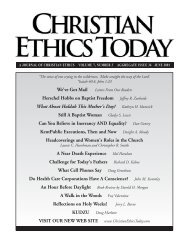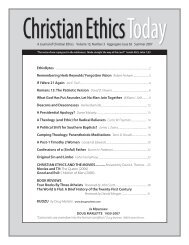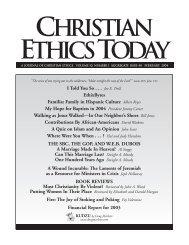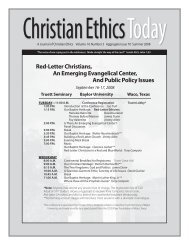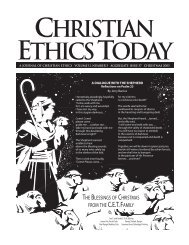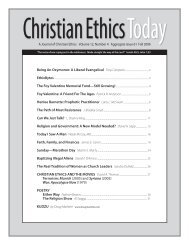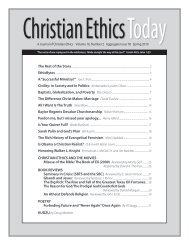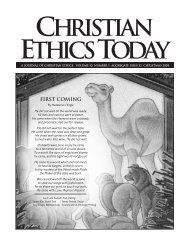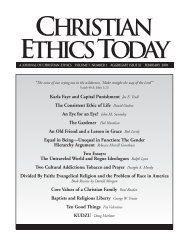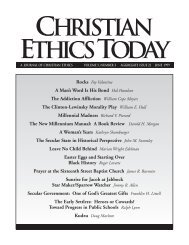Issue 033 PDF Version - Christian Ethics Today
Issue 033 PDF Version - Christian Ethics Today
Issue 033 PDF Version - Christian Ethics Today
You also want an ePaper? Increase the reach of your titles
YUMPU automatically turns print PDFs into web optimized ePapers that Google loves.
The Fruit of Women in Ministry<br />
As president of the WCTU, perhaps the best-organized<br />
women’s movement of any era, Willard observed the<br />
advance of Christ’s kingdom through the leadership of women.<br />
Women served as superintendents over “departments of<br />
Evangelism, of Bible Readings, [and] of Gospel Work for railroad<br />
employees, for soldiers, sailors, and lumbermen; of<br />
prison, jail, and police-station workers” (p. 57). These women<br />
regularly studied and expounded “God’s Word to the multitude,<br />
to say nothing of the army in home and foreign missionary<br />
work, and who are engaged in church evangelism” (p. 57).<br />
One woman, after 25 years as a pastor and preacher, states<br />
that “there is not work outside the home circle upon which<br />
women can so consistently and properly enter as that of the<br />
<strong>Christian</strong> ministry . . . none can be so well fitted by nature for<br />
understanding the great problems of character and destiny as<br />
those whom God has appointed to give birth to new life and to<br />
mould the characters of the young.”<br />
Yet, the ministry of these women remained outside the<br />
church, “not because they wish to be so, but because she who<br />
has warmed them into life and nurtured them into activity is<br />
afraid of her own gentle, earnest-hearted daughters”(p. 98-99).<br />
A church that breathes life into a woman’s soul, while bidding<br />
her to serve elsewhere is a spectacle that is “both anomalous<br />
and pitiful,” (p. 58) claimed Willard. When will the church<br />
call in “these banished ones, correlate their sanctified activities<br />
with her own mighty work, giving them the same official<br />
recognition that it gives to men?” Prayer meetings in which<br />
women’s voices are excluded are declared lifeless and poorly<br />
attended, noted Willard .<br />
Both Views Presented<br />
Willard next offers renowned theologians and preachers a<br />
venue to defend or oppose women’s public ministry.<br />
Each tackles a difficult passage or defrocks biblical interpretation<br />
that is considered inconsistent. An anonymous contributor,<br />
whose editorial services reaches “several thousand readers<br />
per month, and is foremost among the leaders of a great<br />
denomination” writes:<br />
“I believe women should be authorized as ministers in<br />
the church of God. . . [because] man has no greater<br />
natural or spiritual rights than a woman to serve at<br />
20 • APRIL 2001 • CHRISTIAN ETHICS TODAY<br />
the altars of the Church, as a minister of the Gospel.<br />
If a woman possesses gifts, graces and usefulness, she<br />
occupies the same vantage-ground before the world,<br />
and is under the same obligations to God . . .If<br />
women can organize missionary societies, temperance<br />
societies, and every kind of charitable organization . .<br />
. why not permit them to be ordained to preach the<br />
Gospel and administer the sacraments of the Church?<br />
If women should withdraw from the churches and all<br />
missionary and merciful work, we would begin to<br />
think that the foundation had dropped out of our civilization”<br />
(p. 58).<br />
Another collaborator suggests that while there is no support<br />
in the New Testament that women or men received formal<br />
ordination at the commencement of their ministry, “we have<br />
unquestioned proofs that women exercised the essential functions<br />
of ministry” (p. 76). Moreover, the whole notion of the<br />
subordination of women, he suggests, stems from the fall. “If<br />
<strong>Christian</strong>ity is completely to restore that which was lost in<br />
Adam, how can it stop short of completely abolishing the subordination<br />
of women, which the Bible declares to be the direct<br />
result of sin” (p. 76-77).<br />
To her credit, Willard invites an articulate opponent to critique<br />
her theological defense of women in ministry. This critic<br />
rightly noted a tendency in Willard to suggest that women possess<br />
natural attributes making them superior to men. Women<br />
are not, her opponent correctly argues, “holier by nature than<br />
men, and if they were this would not make them better ministers.<br />
An angel from heaven is not more fitted to preach the<br />
grace of Christ than was Saul, the chief of sinners.” We cannot,<br />
I would agree, sacrifice the foundations of “<strong>Christian</strong> theology<br />
for the misty sentimentalism that expatiates on the natural<br />
goodness of woman” (p. 78).<br />
Perhaps the greatest strength of Women in the Pulpit is that<br />
it exposes the myriad of ways in which <strong>Christian</strong>s read the<br />
Bible inconsistently. “A practice prohibited in one sentence and<br />
regulated in another, by the same author, shows either variability<br />
in opinion, or else an intended limitation in the original<br />
prohibition” (p. 117). Clearly, the Bible allows for women’s<br />
preaching and public ministry, and to deny women this right is<br />
a poor reading of the text, a hindrance to the kingdom of God,<br />
and an injustice to those created in God’s image. ■



